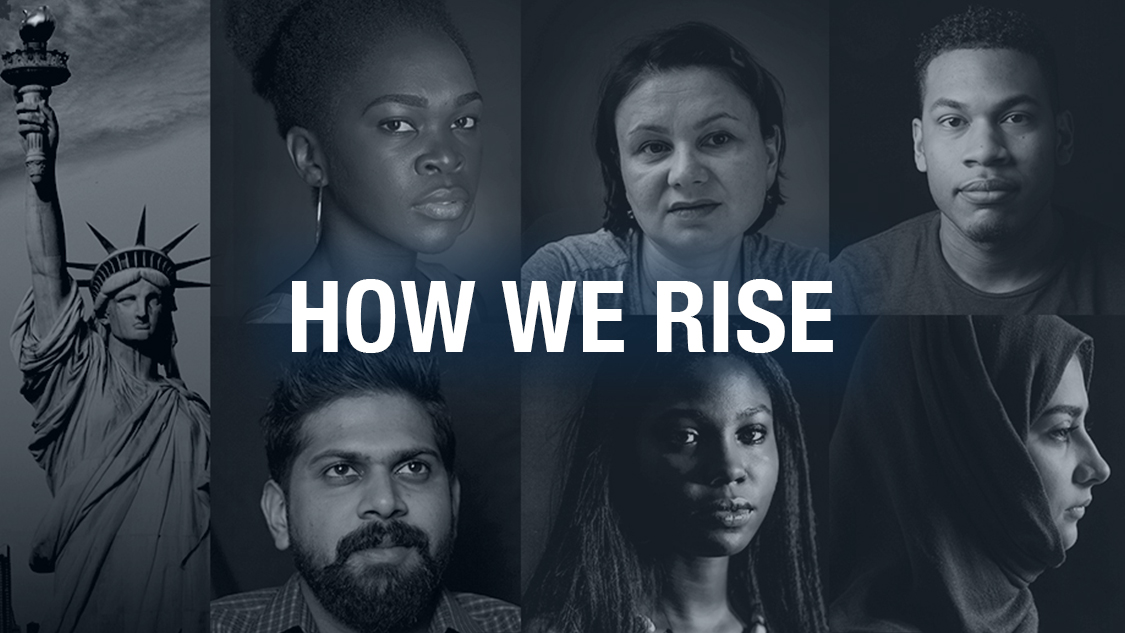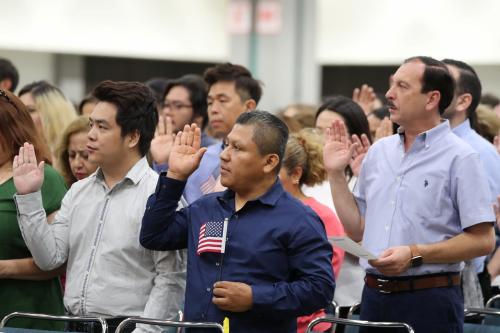Some suggest the 2020 presidential election highlighted a gender gap among Black voters, prompting scrutiny of the effects of hypermasculine and anti-establishment rhetoric on the voting behavior of Black men. Public discourse on the voting behavior of Black men tends to treat this group of voters as a homogenous group. It overlooks how the tripling of Black immigrants since 1980 diversifies voting preferences within the community.
Despite constituting 11% of the 2018 immigrant electorate, Black immigrants are often neglected in discussions about Black politics, revealing a need for a more inclusive analysis of voter dynamics.
As this blog will further explore, my analysis on this issue concludes that in 2020, foreign-born Black men showed the most support for Donald Trump at 30%, versus 11% of U.S.-born and 10% of second-generation Black men. These differences challenge the idea of a uniform Black voting bloc.
Former President Barack Obama’s recent comments about Black men have led to a wave of commentary about a shift in voting patterns from Democrat to Republican among Black Americans. Though an overwhelming majority of Black men seem to still tilt toward Vice President Kamala Harris, there is a growing demographic of Black men favoring former President Donald Trump.
Discussions regarding the voting behaviors of Black men often emphasize economic challenges and frustrations with the Democratic agenda. Missing in the debate is the role of immigration status among Black American men and Black Americans more broadly. Currently, 12% of Black adults are foreign-born Americans, and another nine percent of Black individuals are second-generation Americans or the children of immigrants. By 2060, it is estimated that the Black immigrant population will make up about one-third of the expected population growth. To date, however, most public discussions regarding voting behavior among Black men remain frustratingly narrow, often neglecting to recognize this diversity. This oversight is particularly significant, as Black adult naturalized citizens comprised 11% of the immigrant electorate in 2018. This disregard for diversity also undermines any sophisticated understanding of Black politics.
Reports suggest the 2020 presidential election brought to light a potential shift in voting patterns among Black voters, particularly Black men, in favor of Donald Trump’s reelection. For instance, Meredith Conroy and Perry Bacon Jr.’s data analysis of the Democracy Fund UCLA Nationscape polling initiative revealed a significant gender gap in voter preference. Black men preferred Joe Biden over Trump at 76% to 17%, while Black women favored Biden at 87% to four percent. Conroy and Bacon claim these findings suggest a larger, more significant trend of Black men showing increased support for Republican political candidates compared to Black women. Building on this claim, political historian Leah Wright Rigueur highlighted that the GOP received the lowest level of support among Black men during the 2008 and 2012 elections. Black women remained loyal to the Democratic Party after the excitement of Barack Obama’s presidency faded, while Black men were drawn to Donald Trump’s “hypermasculine, anti-establishment, pro-capitalist rhetoric.”
Regrettably, the contemporary discourse on Black male voters often relies on racial stereotypes and oversimplifications, treating this diverse group as a single, monolithic voting bloc. Such a reductive perspective fails to account for the significant demographic transformations occurring among the population of Black individuals in the United States. For instance, the Pew Research Center’s analysis of Census Bureau data reveals that the number of Black immigrants in the U.S. grew from around 800,000 in 1980 to 4.6 million in 2019, contributing to 19% of the overall increase of 20 million in the Black population during that time.
Focusing specifically on Black men, I utilized data from two waves of the American Trends Panel (ATP), a probability-based, nationally representative, monthly panel survey made up of roughly 10,000 participants above 18 years of age in the U.S. The ATP obtained detailed demographic information from respondents in Wave 60 of the ATP. I matched respondents from this wave to Wave 78 of the ATP, which meticulously matched respondents from their self-reported voter choice to official state voter files to identify validated voters, enhancing data accuracy and mitigating biases scientists typically find in exit poll data. This methodology allows me to assess the voter choice of U.S.-born, foreign-born, and second-generation Black American men who voted for either Donald Trump or Joe Biden (N=250).
From my statistical analysis of the ATP waves, most Black male voters surveyed were U.S.-born (79.61%). In contrast, fewer were foreign-born (11.83%) or second-generation Black American men (8.56%). Among Black American male voters, foreign-born Black American men exhibited the most substantial support for Donald Trump, with a whopping 30% of them casting their votes for him. This support far exceeds the 11% from their U.S.-born counterparts, while second-generation Black American men exhibited even less support for Donald Trump, with only 10% backing him. This stark contrast emphasizes the unique political inclinations of foreign-born Black American men, who may resonate more strongly with Trump’s rhetoric, potentially influenced by varying cultural or socioeconomic perspectives shaped by their immigrant experiences. In contrast, U.S.-born and second-generation Black American men exhibited similar voting patterns, both being significantly less inclined to support Trump than their foreign-born counterparts.
Notably, political preferences among Black men are not immutable; they may evolve across generations. This is particularly evident in the similarities between the voting patterns of second-generation, verified, Black American male voters and those born outside the United States, implying that acculturation plays a notable role in shaping voter choice. These findings underscore the need for more extensive studies examining Black male voters over time to cultivate a more nuanced understanding of Black political dynamics, which vary considerably within the community due to factors such as immigration status and gender.
The future of politics among Black men is poised to be increasingly diverse and complex, reflecting the significant variety within its voting population. This profound diversity is often overlooked in political discourse, which limits its scope to mere gender considerations. A more nuanced discourse on this topic would extend to factors such as immigration status. This is especially needed, given that two of the last three presidential nominees from the Democratic Party (Barack Obama and Kamala Harris) are second-generation Black Americans. Notably, foreign-born Black American men represented the most fervent supporters of Trump, suggesting that their vote choice is shaped by different considerations relative to those influencing the political orientation of U.S.-born Black Americans.
The Brookings Institution is committed to quality, independence, and impact.
We are supported by a diverse array of funders. In line with our values and policies, each Brookings publication represents the sole views of its author(s).








Commentary
Not like us? Exploring foreign-born Black men’s distinct voting patterns in the 2020 election
November 1, 2024